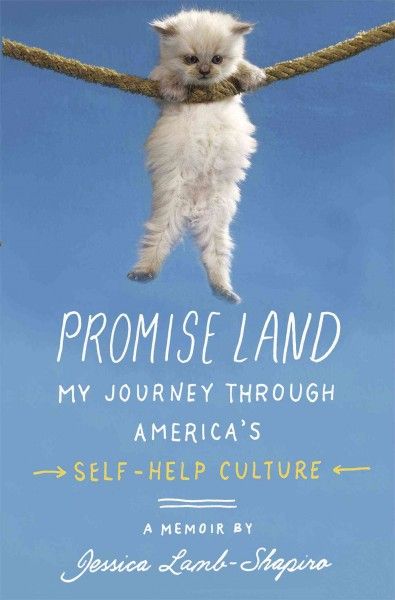Promise Land by Jessica Lamb-Shapiro
 Jessica Lamb-Shapiro is well-versed in the language of self-help. Her father is a psychologist, parenting expert, and self-help author. In Promise Land she explores the culture of American self-help, trying to find why self-help has such a strong appeal and how the self-help industry became so huge. She goes to conferences, walks on hot coals, makes a vision board, attends lectures, takes a class to deal with her fear of flying, and volunteers at a camp for teens dealing with grief. Promise Land starts with Lamb-Shapiro and her father attending a workshop/conference by Mark Victor Hansen, co-creator of the Chicken Soup franchise. The conference focuses on how to write and market the next big self-help book series. Her father has written numerous books, but none have been best-sellers. His setbacks don't seem to matter, because he is still relentlessly, endlessly, annoyingly positive. In addition to writing books, he makes and sells educational/therapeutic games and toys (the Ungame, anyone?). She experiences the world of self-help first-hand by helping him sell his products at conferences all over the country. At every turn she counters her father's boundless positivity with a healthy dose of cynicism. Her relationship with her father is a constant thread throughout the memoir. He provides a way into a lot of self-help communities, but more than that Lamb-Shapiro uses the time spent together and the self-help world to explore their relationship and her upbringing. They have an interesting rapport because her mother died when she was very young. They never talked about it, and all the knowledge of her mother comes to her secondhand. After that rather traumatic event, he remarried, moved around, got divorced - lots of change at a time when people often recommend stability. In this book she looks at the legacy of self-help within her own family, how that has shaped her, and how that can help her deal with her unresolved grief. The real strength of this book is that it is a memoir: it is not a full-scale exploration of the culture, but her journey through it. She acknowledges that self-help can be really helpful, but that it also might be total hokum. It depends on the person, and it also depends on the self-help. She starts the book with cynicism, but in the end she learns to open herself up. That's not to say she tried a miracle cure and it totally worked, but instead that she saw that holding all her emotions in might not be the best way for her to be healthy. That was her journey through self-help, and I enjoy being there with her. Allie @ Central
Jessica Lamb-Shapiro is well-versed in the language of self-help. Her father is a psychologist, parenting expert, and self-help author. In Promise Land she explores the culture of American self-help, trying to find why self-help has such a strong appeal and how the self-help industry became so huge. She goes to conferences, walks on hot coals, makes a vision board, attends lectures, takes a class to deal with her fear of flying, and volunteers at a camp for teens dealing with grief. Promise Land starts with Lamb-Shapiro and her father attending a workshop/conference by Mark Victor Hansen, co-creator of the Chicken Soup franchise. The conference focuses on how to write and market the next big self-help book series. Her father has written numerous books, but none have been best-sellers. His setbacks don't seem to matter, because he is still relentlessly, endlessly, annoyingly positive. In addition to writing books, he makes and sells educational/therapeutic games and toys (the Ungame, anyone?). She experiences the world of self-help first-hand by helping him sell his products at conferences all over the country. At every turn she counters her father's boundless positivity with a healthy dose of cynicism. Her relationship with her father is a constant thread throughout the memoir. He provides a way into a lot of self-help communities, but more than that Lamb-Shapiro uses the time spent together and the self-help world to explore their relationship and her upbringing. They have an interesting rapport because her mother died when she was very young. They never talked about it, and all the knowledge of her mother comes to her secondhand. After that rather traumatic event, he remarried, moved around, got divorced - lots of change at a time when people often recommend stability. In this book she looks at the legacy of self-help within her own family, how that has shaped her, and how that can help her deal with her unresolved grief. The real strength of this book is that it is a memoir: it is not a full-scale exploration of the culture, but her journey through it. She acknowledges that self-help can be really helpful, but that it also might be total hokum. It depends on the person, and it also depends on the self-help. She starts the book with cynicism, but in the end she learns to open herself up. That's not to say she tried a miracle cure and it totally worked, but instead that she saw that holding all her emotions in might not be the best way for her to be healthy. That was her journey through self-help, and I enjoy being there with her. Allie @ Central
